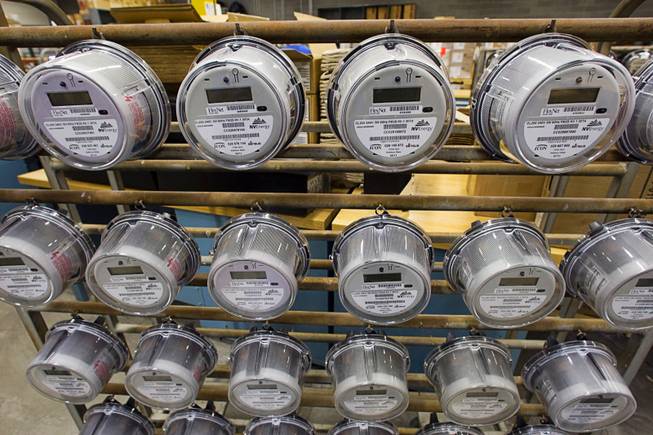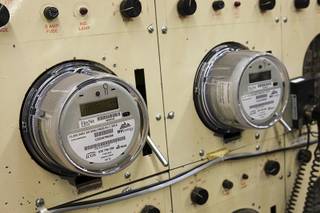Smart meters spawn conspiracy talk: They know what you’re watching on TV!

Smart meters hang on a rack at the NV Energy meter shop Tuesday, March 6, 2012. NV Energy plans to install 1.3 million smart meters as part of an electrical grid modernization.
Thursday, March 8, 2012 | 2 a.m.
Related story
Related story
The tiny box NV Energy is installing on customers’ homes to monitor energy usage and transmit that data to the company has become the latest target of a vocal cadre of activists.
Many critics of smart meters have raised legitimate concerns about the collection of detailed data and raised issues about the possible effects of radiation emitted by the devices.
But more vocal opponents who have flooded recent hearings before the Public Utility Commission have relied on dubious exaggerations that echo enduring conspiracy theories — tinfoil hats, black helicopters, fluoride in the water.
A sampling of complaints from last week’s hearing:
“We will not be military lab rat slaves to experiment on!”
“Just as coumadin (a blood thinner) is rat poison used in medicine, smart meters are rat poison used in energy!”
“They can know what you’re watching on TV!”
Commissioners were startled by the outcry over smart meters — particularly when strange packages began arriving at their homes and their addresses were posted online.
Some of the public comments were so caustic that the commission took the unusual step of hiring armed security to keep the peace at its most recent hearing.
The hearing was called to ensure NV Energy is implementing the smart meter program appropriately and consider giving customers a way to opt out of the program. But the firestorm of unprovable claims transformed it into something reminiscent of past debates on fluoridation of public water supplies.
Committee chairs at the Legislature who conduct fluoridation hearings know to schedule blocks of time and arrive with a store of patience. In a conspiracy that dates back to the 1950s, some opponents of fluoridation believe the chemical is used by the government for mind control. Others believe it’s a poison that causes all manner of health problems. Some of those who fight it at the Legislature arrive in costumes to make their point.
Despite the outlandishness of some of their claims, opponents of fluoridation have succeeded in moving public opinion and preventing fluoride from being added to the water supply in localities across the nation, including Washoe County. Similarly, opponents of smart meters convinced regulators to give them an opt-out.
Unfortunately, for citizens who favor a more rational approach and those in charge of setting policy, experts say human nature makes us prone to believe conspiracy theories.
“It’s a very basic sort of human trait to be looking for patterns,” said Matthew Baum, a public policy professor at the Harvard Kennedy School of Government. “Add that to somebody who is a little extreme, a little paranoid, and you start looking for patterns where they don’t exist. Throw on top of that a culture that is really stressed out about surveillance these days and it’s not surprising.”
Conspiracy theories are particularly difficult for public policymakers to combat once they take hold in the minds of a vocal constituency.
“Initially, it’s probably just the pretty nutty people who believe it, but then it just percolates a very long time,” Baum said. “Then it’s really hard to prove a negative, and that’s why conspiracy theories are almost impossible to debunk.”
Beyond harboring a wariness of government’s Big Brother propensities, society is hyper-aware of businesses tracking Internet usage and collecting other personal data to better advertise to consumers, Baum said.
These concerns have influenced critics of the smart meters.
Science is somewhat inconclusive on whether radiation from cellphones and wireless routers, the same type of radiation emitted by smart meters, is completely benign. But smart meters, according to NV Energy, emit a tiny fraction of the radiation generated by many cellphones and wireless routers.
(To the annoyance of some commissioners, some opponents complaining about the smart meter radiation were using cellphones.)
But it sets the perfect conditions for the smart meter outrage.
“People vary widely in how paranoid they are,” Baum said. “Some people go to great lengths to protect their privacy and some not at all. But privacy is a real issue right now.”
The privacy issue is what prompted the Clark County Republican Party to get involved in the smart meter issue. Tea Party groups in California helped fuel the public outrage against smart meters that led several townships in the northern part of the state to attempt to ban them.
“It’s seen as a Big Brother thing,” Clark County GOP Chairman David Gibbs said. “And it’s NV Energy; it’s not even the government. It’s a private company getting more access to more information, and you don’t even know what they have access to.”
Smart meters do collect more detailed data than the typical analog meter, which provides a summary of a month’s worth of energy use. Smart meters track it down to the hour. But they do not gather the detailed information decried by opponents, some of whom claim a smart meter can tell the power company exactly what DVD is being watched inside the home or what personal appliances are being used.
Company officials said smart meters only track a household’s overall usage.
So why, if many of their claims are outlandish, do conspiracy theorists succeed at influencing public policy?
The answer is simple, Baum said.
“The people who aren’t worried about it haven’t given it three minutes of thought,” he said. “They aren’t going to show up and lobby their representative. They aren’t going to vote against anybody who takes a position on it. But the people on other side are going to show up, make a lot of noise, bang the gong, maybe organize to defeat you as a politician, and (politicians) pay attention to them.”
This article has been archived for your research. The original version from Las Vegas Sun can be found here.



